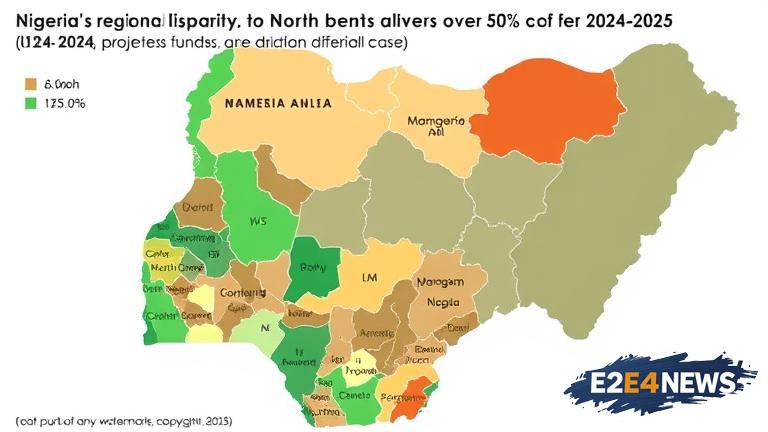The recent allocation of project funds by the Nigerian government has raised eyebrows, with the northern region receiving a disproportionate share of over 50% of the total funds. This development has sparked intense debate and discussion among stakeholders, with many expressing concerns about the potential implications of such a skewed distribution of resources. The 2024-2025 project funds are intended to support various development initiatives across the country, including infrastructure development, education, healthcare, and economic empowerment programs. However, the allocation of over 50% of these funds to the northern region has raised questions about the government’s commitment to promoting regional balance and equity. Critics argue that this allocation will exacerbate existing regional disparities and create new challenges for other regions, particularly the southern states. They point out that the southern states have historically been the backbone of Nigeria’s economy, generating the bulk of the country’s revenue through oil and gas production, as well as other economic activities. Despite this, the region has consistently received a smaller share of federal allocations, leading to a sense of marginalization and neglect. The northern region, on the other hand, has historically received a larger share of federal allocations, due in part to its larger population and geographical size. However, this has not necessarily translated to better development outcomes, as the region still grapples with significant development challenges, including poverty, illiteracy, and insecurity. The allocation of over 50% of the 2024-2025 project funds to the northern region is likely to further widen the development gap between the north and the south, creating new social, economic, and political challenges. Many are calling on the government to review its allocation formula and ensure that resources are distributed more equitably across the country. They argue that a more balanced approach to resource allocation will help to promote national cohesion, stability, and development. Others have expressed concerns about the potential impact of this allocation on the country’s economy, particularly in the southern states. They point out that the southern states are already struggling to cope with the challenges of economic downturn, including high unemployment, poverty, and infrastructure decay. The allocation of a smaller share of federal funds to the region will only exacerbate these challenges, creating a sense of desperation and hopelessness among the population. The government has defended its allocation formula, arguing that it is based on a careful assessment of the development needs of each region. However, many are skeptical about this claim, pointing out that the allocation formula appears to be biased in favor of the northern region. They argue that the government should prioritize the needs of all regions, rather than favoring one region over others. The controversy over the allocation of 2024-2025 project funds has highlighted the need for a more transparent and inclusive approach to resource allocation in Nigeria. It has also underscored the importance of promoting regional balance and equity, in order to ensure that all regions have an equal opportunity to develop and thrive. As the debate over the allocation of project funds continues, many are watching with keen interest to see how the government will respond to the concerns of stakeholders. Will the government review its allocation formula and ensure that resources are distributed more equitably across the country? Only time will tell. The Nigerian government has a responsibility to promote the development of all regions, rather than favoring one region over others. The allocation of over 50% of the 2024-2025 project funds to the northern region is a step in the wrong direction, and the government should take urgent steps to address the concerns of stakeholders. The country’s development depends on it.





